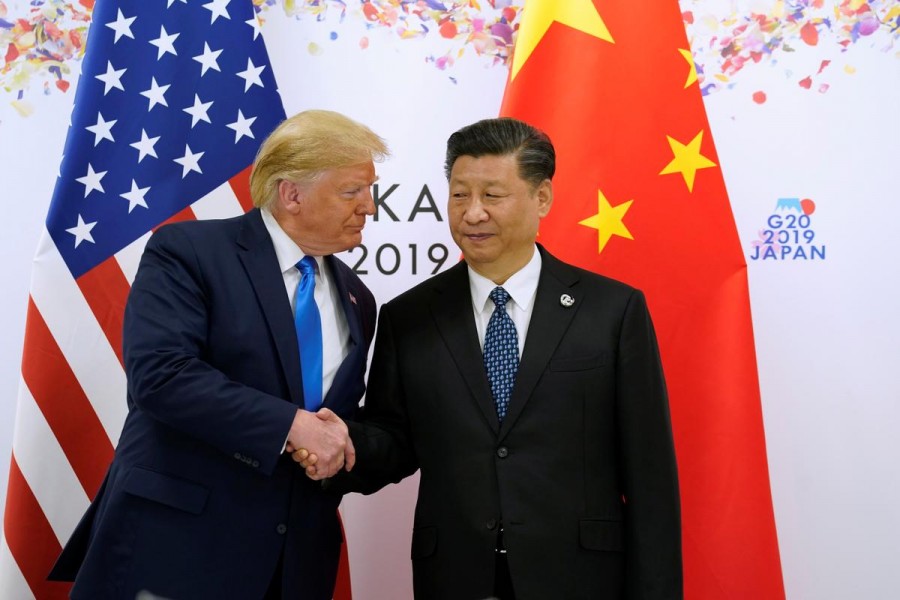
Published :
Updated :

US President Donald Trump said on Saturday he was open to a potentially “historic” trade deal with Chinese President Xi Jinping, as they began talks that could ease tensions or plunge the world’s two largest economies into a deeper trade war.
The dispute has already cost companies in both countries billions of dollars, disrupted global manufacturing and supply lines, and roiled global markets.
Trump and Xi were meeting on the sidelines of a Group of 20 (G20) summit in Osaka, western Japan, where the trade feud including a dispute over Huawei Technologies Co has raised concerns about its threat to global growth.
“I actually think that we were very close and ... that something happened where it slipped a little bit, and now we’re getting a little bit closer,” Trump told Xi as the cameras rolled at the start of the closely-watched talks.
“But it would be historic if we could do a fair trade deal.
“We’re totally open to it, and I know you’re totally open to it.” He gave no details of what a deal would entail.
The US president has said he would extend existing tariffs to cover almost all imports from China into the United States if there was no progress from the meeting on wide-ranging US demands for economic reforms.
Xi told Trump he was ready to exchange views on fundamental issues and stressed the need for dialogue over confrontation.
“Forty years on, enormous change has taken place in the international situation and China-U.S. relations, but one basic fact remains unchanged. China and the United States both benefit from cooperation and lose in confrontation,” Xi said.
“Cooperation and dialogue are better than friction and confrontation,” he added.
“Today I’m prepared to exchange views with you on the fundamental issues concerning the growth of China-U.S. relations, so as to set the direction for our relationship in the period to come and to advance the China-U.S. relationship based on coordination, cooperation and stability,” Xi said.
China’s Global Times, published by the ruling Communist Party’s official People’s Daily, said earlier on Saturday the world had to “contain capricious U.S. actions”, pointing to examples like Trump withdrawing from the Paris climate accord.
“The world needs to rein in the U.S., although it’s difficult,” the paper said in an editorial.
“The problem is that many countries have misgivings in expressing their opposition to U.S. bullying tactics out of fear for U.S. power, or hope to profit from the U.S. stirring up the global order through opportunism.”
Difficult trade relations
The leaders of the big economies will agree on Saturday to accelerate reforms to the World Trade Organization but stop short of calling for the need to resist protectionism in their closing communique, Japan’s Nikkei newspaper said.
The best outcome from the Trump-Xi talks would be a resumption of trade negotiations, Marc Short, the chief of staff for US Vice President Mike Pence, told reporters at the White House on Friday.
The United States says China has been stealing US intellectual property for years, forces US companies to share trade secrets as a condition for doing business in China, and subsidizes state-owned firms so they can dominate both domestic and international business.
China says the United States is making unreasonable demands and must also make concessions.
“We feel the U.S. side is exerting extreme pressure,” a Chinese diplomat told Reuters on Friday on condition of anonymity. “It is raising many demands but doesn’t want to make concessions.”
The dispute escalated when talks collapsed in May after Washington accused Beijing of reneging on reform pledges. Trump raised tariffs to 25 per cent from 10 per cent on $200 billion of Chinese goods, and China retaliated with levies on US imports.
As relations between the two countries have soured, the dispute has spread beyond trade. The US administration has declared Chinese telecommunications giant Huawei a security threat, effectively banning US companies from doing business with it.
US officials have also put pressure on other governments worldwide to drop Huawei from plans for fifth generation, or 5G, network development.
Trump has suggested easing US restrictions on Huawei could be a factor in a trade deal with Xi.
China has demanded the US drop the restrictions, and said Huawei presents no security threat.
Several G20 leaders warned on the first day of the summit on Friday that growing Sino-U.S. trade friction was threatening global growth.
“The trade relations between China and the United States are difficult, they are contributing to the slowdown of the global economy,” European Commission President Jean-Claude Juncker told a news conference.


 For all latest news, follow The Financial Express Google News channel.
For all latest news, follow The Financial Express Google News channel.